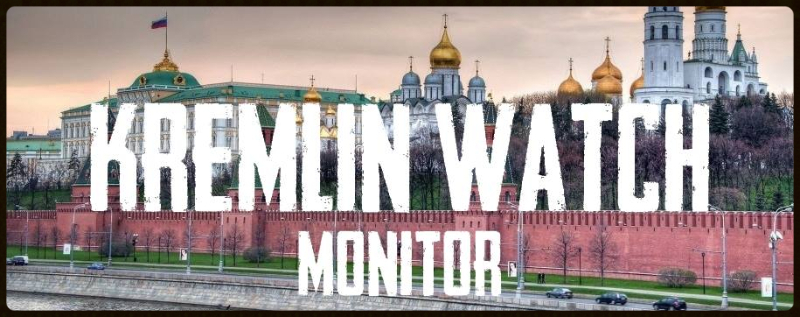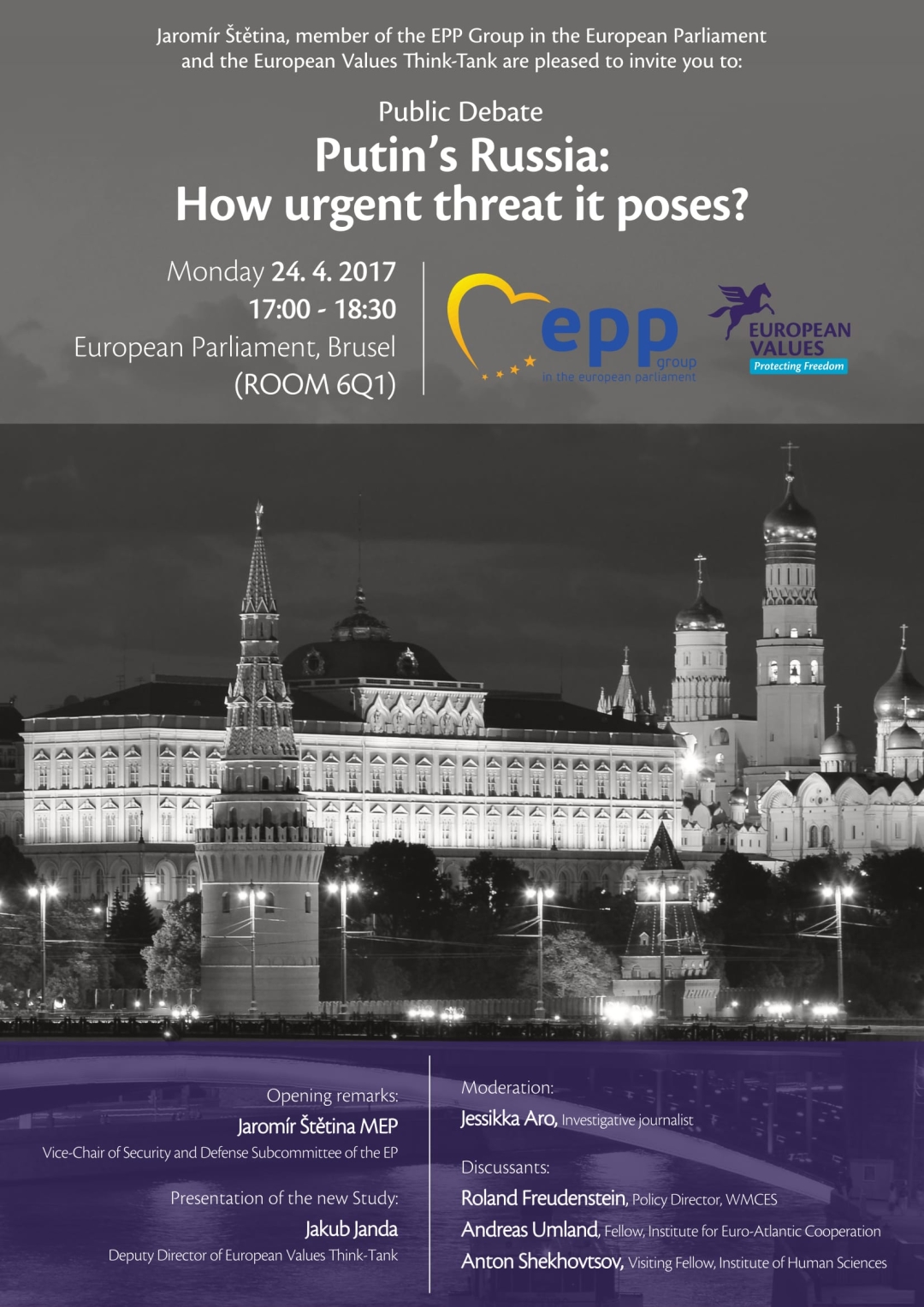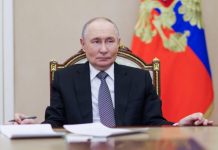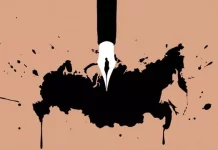
Invitation: How Europe sees Putin’s Russia
On April 24, we will present a new major study in the European Parliament, which evaluates policies of individual EU28 countries towards Russia. It is our pleasure to invite you to the public hearing (www.europeanvalues.net/putin/).

New publication: How Kremlin controls major Russian media
We would like to introduce a new Kremlin Watch Report, authored by Ilyas Sharibzhanov, Analyst of the Kremlin Watch Programme. Mass media in Russia have changed significantly since the days of President Yeltsin and the contrast with the free and independent media in Russia of just 20 years ago has been ever so evident for the past three years, with Russia’s media turning from a market into a state-organized system of propaganda machine. The document analyses these changes.
Putin’s Champion Award
Our Expert Jury consisting of Jessikka Aro, Anton Shekhovtsov, John Schindler and Michael Weiss regularly vote on the dangerousness of several candidates you can nominate via e-mail or Twitter.
The 8th Putin’s Champion Award Recipient is:
Jean-Luc Mélenchon
For ignoring Russian aggression and willingness to renegotiate Ukrainian borders.

The Expert Jury ranked his Putin-supportive job with
3.3
(out of 5) mark.
The rating signals how much the recipient contributed to the interest of the Putin’s aggressive regime. It is calculated as an average of ratings assessed by the Expert Jury of this Award.
You can find more details about the award and the former recipients here.
Weekly Update on the Kremlin Disinformation Efforts in Europe
The Czech Government adopted a new (State) Defence Strategy.
It also reads in unofficial translation:
- “The Russian Federation openly projects its power ambitions in Eastern Europe, including the use of military force.
- (The Russian Federation) does not hesitate to break international law, including breaching the territorial integrity of neighbouring countries.
- (The Russian Federation) uses tools of the hybrid campaign against the EU and NATO member states, including the use of disinformation activities and cyber attacks.”
Full version, yet only in Czech language: http://www.mocr.army.cz/ministr-a-ministerstvo/odkazy/odkazy-46088
Similar wording can be found in other Czech strategic government documents: the 2015 Security Strategy, 2015 Foreign Policy Strategy, or the 2016 National Security Audit.
The Estonian Internal Security Service published its Annual Review for 2016. It describes several cases of caught Russian spies, including the first case involving an alleged recruit of the GRU military intelligence service.
Russian cover-up of Syrian chemical attacks
The National Security Council issued a dossier accusing Russia of conducting a disinformation campaign aiming to cover up the role of the Syrian government in recent chemical attacks. The report includes declassified intelligence on the attack, showing that the Russian Federation and Syria both spread “false narratives” concerning the incident. Russian President Putin responded by comparing the accusation to the case of intelligence findings on weapons of mass destruction in Iraq in 2003.
The rising number of cyber attacks
The Joint Force Quarterly recapitulates the attacks on information systems in recent years, showing the increase in their numbers. From the report:
- The Pentagon reports getting 10 million attempts a day, just as well as The National Nuclear Security Administration.
- The United Kingdom reports 120,000 cyber incidents a day, which is almost as many as the state of Michigan deals with.
- Utah states that it faces 20 million attempts a day – up from 1 million a day 2 years ago.
The Bundeswehr is also a common target, noting more than 280,000 cyber-attacks only during January and February. The German government takes the issue seriously, establishing a new Cyber and Information Space Command (CIR) in the beginning of April. The CIR should involve around 14,000 military and civilian staff and include structures dealing with IT, cyber-security, military reconnaissance, geo-information and psychological warfare. You can read the analysis of this move by Justyna Gotkowska from the Centre for Eastern Studies.
Helsinki will host a newly established centre for research on the tactics of hybrid threats. Experts from several EU and NATO countries, including The United States, Britain, France, Germany, or Poland, will participate. According to the Foreign Minister of Finland Timo Soini, one of the aims should also be to boost society’s resilience against hybrid operations.
Kremlin Watch Reading Suggestion
A Field Guide to Fake News;
compiled by Liliana Bounegru, Jonathan Gray, Tomasso Venturini & Michele Mauri; published by Public Data Lab.
A collection of recipes for those who love to cook with digital methods – that is how this unique publication about fake news describes itself. Focusing on the character of online circulation and reception of fake news, the “field guide” offers its readers new ways of mapping and responding to this phenomenon. It contains a number of recipes, which can be used by everyone with basic computer literacy who wants to grasp comprehensively the topic of fake news circulation on the internet or simply put a specific fake news into broader context. Every recipe is well-described and illustrated with examples, which are very interesting by themselves. To get a better understanding of how it all looks, here you can see a recipe how to create a network of cross-references between pages mentioning a certain fake story, and the result as well.

Result:

The first set of recipes maps fake news hotspots on Facebook and offers answers to questions such as “what publics does fake news animate”, “how may the trajectory of a fake news story be traced” or “do fact-checking initiatives reach the publics of fake news” (on Facebook). As with the other recipes, one can use the methods described and apply them to fake news of their choice. The second set focuses on tracing the circulation of fake news on the web and proposes various ways how to find out more about where do fake news originate and how they spread. Finally, the third set of recipes provides instructions how to use tracker signatures to map the techno-commercial underpinnings of fake news sites.
Read the full text here.
Euroatlantic experts on disinformation warfare
As the EU’s High Representative Federica Mogherini approaches half of her term, POLITICO asked foreign policy experts to evaluate her performance. Her mark on Russia is not very high, unsurprisingly. “Mogherini completely fails to address a threat more than a dozen EU member states see as a major danger,” says Jakub Janda in his contribution to the assessment.
A Russian-born activist Masha Gessen and a former FBI special agent Clint Watts from the Centre for Cyber and Homeland Security discuss the role of disinformation concerning the ties between the President Trump’s administration and Russia, and how bots, trolls, and fake news can influence politics on Radio Times.
John Cappello describes in his article for the Foundation for Defence of Democracies what narratives are spread and politicians supported by the Kremlin’s disinformation campaign in the Western Balkans.
Belarus has been off the grid of the disinformation campaigns until recently. The motives of the newly acquired attention are discussed by Amy Mackinnon in the article for .Coda.
The Vulnerability Index
Subversive Russian Influence in Central Europe
The European Values think-tank participated in a new study published by the GLOBSEC Policy Institute, together with counter-parts from Hungary and Poland. The aim was to describe how vulnerable are the societies of the Visegrad countries to subversive foreign influence and to point out the weak spots and best practices in addressing these threats, with the focus on five areas – public perception, political landscape, media, state countermeasures, and civil society.

The Czech Republic ranked the third among the Visegrad group. Czech society, despite being quite euro-sceptic simultaneously rejects a pro-Russian orientation. One notable exception is Czech President Miloš Zeman, who is regarded by many as the most important and visible pro-Russian political actor in the region. At the same time, the current Czech government is leading the way in addressing subversive foreign efforts by setting up a dedicated anti-hybrid threats task force at the Ministry of Interior and is in close cooperation with a very active civil society.
Czech Disinformation Corner
National Bank of the Protectorate: According to the New Republic website, the behaviour of the Council of the Czech National Bank (ČNB) suggests it is in the service of foreign capital or colonizers. The recent intervention of the Czech National Bank allegedly increased already huge exchange losses by 50 %. AC24 informed that the price for previously weak Crown is 2 trillion CZK stolen from Czech citizens. Das neue Europa, we can read on Aeronet. Strengthening the Crown, according to its chief editor, really means setting up a reaction mechanism from Berlin in order to deal with an unsustainable situation in the area of low wages in the “Protectorate of Bohemia and Moravia.”
False flag in Syria: The reactions to the chemical attack in Syria varied on the disinformation websites. For example, according to Protiproud, the incident was a long-prepared excuse of the Pentagon generals for an indirect attack of Russia. AC24 references alleged sources amongst former CIA officials, according to which it was a fraud just as the sarin attack in Syria in 2013. Apart from other things, also former CIA official Philip Giraldi allegedly confirmed that neither the Syrian government nor the Russians are behind the attack. The government of Bashar al-Assad, according to fringe sources, would not have any benefit from using chemical weapons. On the contrary, the NATO inciters don’t want peace and desire prolongation of the war and destruction of Syria. Rescue operations after the chemical attack in Idlib in the White Helmets videos are faked and conducted on a dead chid.
Kremlin Watch is a strategic program of the European Values Think-Tank, which aims to expose and confront instruments of Russian influence and disinformation operations focused against liberal-democratic system.




